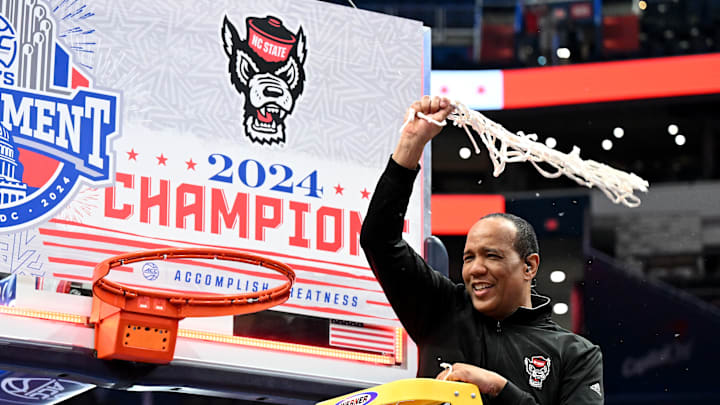"Bid Thief." Two words that strike fear into the heart of every fan whose team sits on the bubble during conference tournament week. Yet, up until last season it was often a minor issue (save for the 2021 season, when games were getting cancelled and stands were empty). In 2023, the auto bid in every multi-bid league went to a team that otherwise would have received an at-large. In 2022, Richmond upset Davidson to win the A-10 and steal a bid that otherwise would have gone to Dayton, whom the Spiders beat head-to-head a mere day before.
The decade before that mostly just saw the occasional team in the PAC-12, A-10, AAC or C-USA (when Memphis was a powerhouse) beat out a couple of at-large teams to make the NCAA Tournament themselves. It was a foreign concept in the five most prominent conferences (and the WCC, where Gonzaga consistently squashed any attempts). The lone exception came all the way back in 2008, when Georgia went 4-12 to tie for last in the SEC and then won the SEC Tournament despite having to win twice in one day because of a tornado delay.
The depth of quality teams in the ACC, Big East, Big Ten, Big 12 and SEC have year in and year out created an impossible gauntlet for any potential bid thief to overcome, often having to defeat three or four soon-to-be NCAA Tournament teams to make it through. So they never did.
But in March 2024, the floodgates opened. Five teams stole bids, and while UAB had a fortunate path, New Mexico beat three at-large teams (Boise State, Colorado State, San Diego State) to win the Mountain West, Oregon took the PAC-12 with wins over Arizona and Colorado, and Duquesne beat Dayton on the way to winning the A-10. And then there was the unthinkable: NC State beating Duke, Virginia, and UNC on successive days to win the ACC Tournament.
So how does this happen? Two reasons, the first being an increase in parity across the one hundred or so best teams, thanks to a higher talent dispersal from the transfer portal, and just a deeper pool of talented basketball players than the sport at all levels has ever had. The other is that as the strength of college basketball becomes more concentrated on the SEC, Big Ten and Big 12, the other conferences no longer have the deep group of at-large teams to knock out these pesky could be bid thieves.
Absolutely nothing that has happened so far in this new season gives any reason to believe that these two factors have changed and in fact, both may be even stronger this year. Looking the major brackets from ESPN's Joe Lunardi, Fox Sports' Mike DeCourcy and Bauertology, the SEC, Big Ten and Big 12 combine for an average of thirty-one bids. Add in twenty-two automatic spots for the likely single bid conferences, and you are left with fifteen total spots between the ACC, Big East, Mountain West, WCC, A-10 and AAC.
So let's dive in to that fifteen total with a list of the seemingly most likely to make it at this moment in time. Duke, Pitt, Clemson, UNC, SMU, UConn, Marquette, St. John's, Creighton, Utah State, San Diego State, Gonzaga, St. Mary's, Dayton and Memphis.
That list doesn't include Louisville or St. Bonaventure, who can both be found in many brackets at the moment. It doesn't include Georgetown or New Mexico, who are quickly charging towards a bid. It doesn't include bubble teams like Villanova, Xavier, Boise State, Washington State, San Francisco and VCU.
And there are another dozen or so teams who have basically ruined their at-large chance at this point but can still be serious March threats if they can improve the next two months. Just look at last year's five thieves, only New Mexico seemed to even be on the bubble at the time. NC State could make a magical run through the ACC again, so could Notre Dame or Wake Forest. Nevada could be incredibly dangerous in the Mountain West if they stop losing every close game.
The A-10 always seems to produce a surprising champion (see 2024, 2022, 2019, 2018, 2017 or 2012 for proof), and have plenty of older, extremely talented but flawed teams this year (George Mason, SLU, St. Joe's, Davidson, Loyola Chicago, Rhode Island). We could even see a two bid Missouri Valley or Big West if Drake or UC Irvine loses in their conference tournament for their second or third loss of the season.
But the American Athletic Conference is absolutely primed for a heist. It's an unprotected truck barreling down the highway, experts are waiting and the security probably doesn't want any trouble. Memphis put together a non-conference resume that makes the Tigers a near lock to make the NCAA Tournament, but the Tigers have proved from last year to December's Arkansas State loss that they are a great bet for a unserious stinker of a game at some point in the AAC Tournament and North Texas, Florida Atlantic or UAB would happy to take advantage.
So over the next two months of looking at bracketology, remember to factor in that the bubble is even smaller than it looks. The bid thieves are coming again, it could be one, it could be two, it could realistically even be five. You've been warned.
